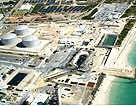
Hillel Fendel
While the Israeli government plans to implement a program to develop new water technologies in the years 2009-2011, it is reported that desalination, the solution of choice for the water shortage, leads to water pollution. At the same time, a Knesset committee has approved a public inquiry into Israel's current water crisis and the government decisions that may have led to it over the past years.
The social-economic ministerial Cabinet, headed by Finance Minister Roni Bar-On, decided on Monday to activate a program to develop new water technologies during the years 2009-2011. This will be a "sequel" to a similar program run by the Ministry of Industry and Trade between 2006-2008. The objective of both programs is/was to stabilize Israel's position as a major player in the international market for water technology and solutions.
"The Israeli market has amassed great experience in dealing with the challenge of the water shortage," Minister Bar-On said. "Our abilities, as well as the unique characteristics of this region, have given Israel a clear advantage and helped place us in the front lines of R&D for water solutions. Israel can and should lead the water technology industry in the world market."
The total budget for the three-year program will be 93 million shekels (roughly $30 million), split among the Ministry of Industry and Trade, the Ministry for the Development of the Negev and Galilee, the Water and Sewage Authority, and the Ministry of Finance. Industry Minister Eli Yishai (Shas) will oversee te project and will report yearly to the government on its progress.
Desalination Has Its Cost
Meanwhile, however, it has been learned that desalination - the most popular choice for solving Israel's water problems - has its price as well. The plant in Ashkelon, Israel's largest, sends 400 tons of iron into the ocean each year, endangering fish and plants and coloring the water red.
Currently, Israel desalinates 135 million cubic meters of water each year - 100 million at the Ashkelon plant, the world's largest reverse osmosis desalination facililty, and the remainder in Palmachim. A third plant, set to be completed by next year in Hadera, is also scheduled to provide 100 million cubic meters of water each year. The government also plans to build additional desalination plants along the Mediterranean coast, producing 600 million annual cubic meters by 2013, and 750 million by 2020.
The production of 750 million cubic meters of water, however, will be at the expense of 3,000 tons of iron spewed into the ocean, if the current rates continue to prevail. Iron is a necessary byproduct of the desalination process. The water pollution can be dealt with more efficiently than at present, the desalinators say, but it will cost more precious beach-side space for an electro-dialysis plant. The Environment Ministry intends to demand that future desalination tenders include a clause requiring the operators to reduce the iron that is dispersed to the sea.
No comments:
Post a Comment